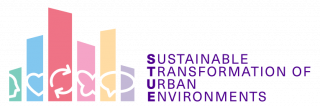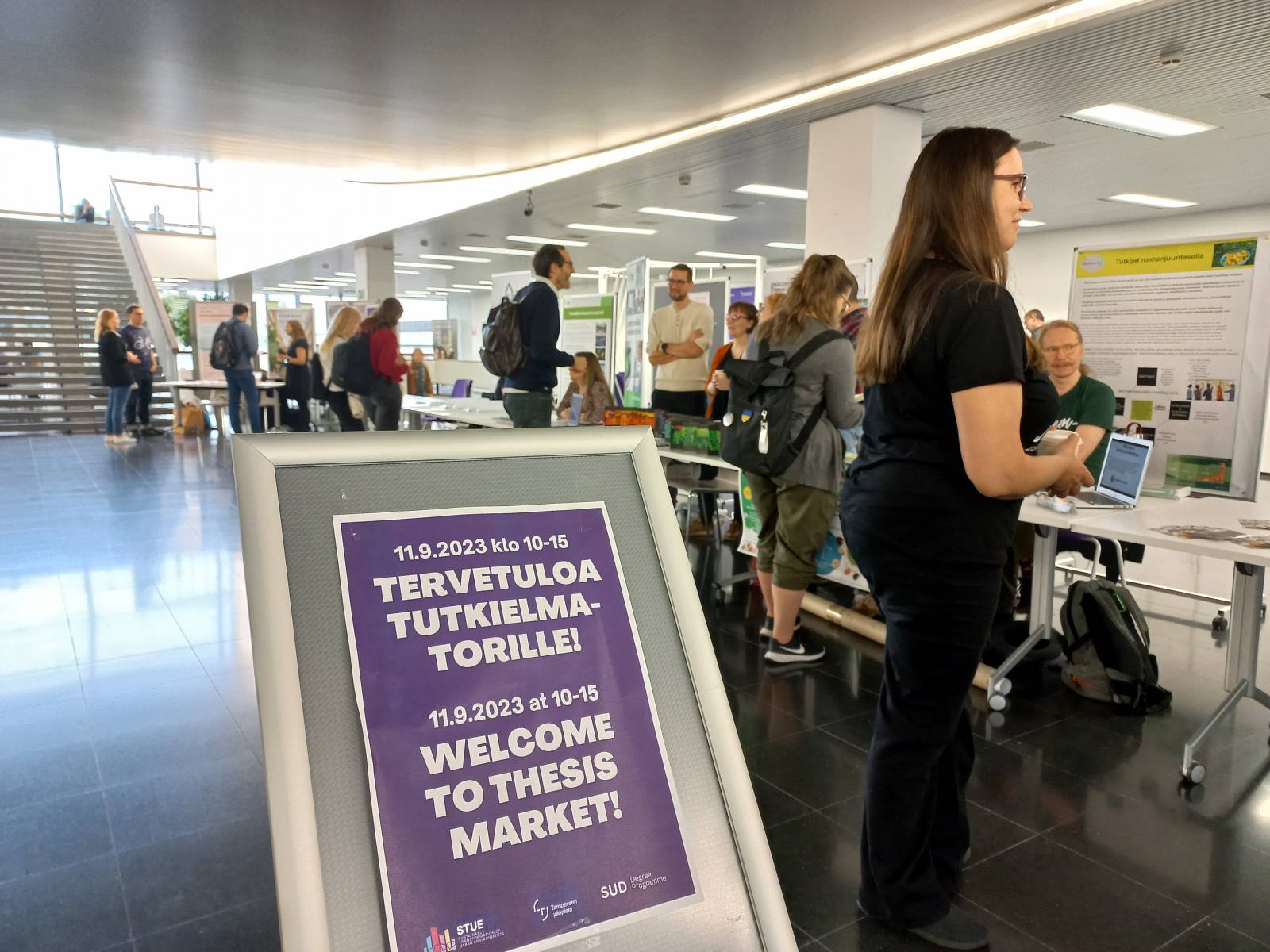City of Tampere, ideas for topics and data by theme
Sustainable food culture
- The possibility of the city to influence children’s and young people’s understanding of food (the impact of food eduction at comprehensive school)
- The impact of landuse on advancing a sustainable food system / How can the city advance a sustainable food system through landuse?
- Possibilities of the city to contribute to advancing a sustainable food system
More information: Elina Pulliainen, etunimi.sukunimi@tampere.fi
Changes in mobility habits
- Data from the mobility carbon footprint calculator can be used as research data. The data includes information about the users’ journeys (length, duration, mode of travel and carbon footprint estimate). It is also possible to plan an intervention, e.g., by sending messages to the users and collect data based on the design of the experiment. More information: Anna Vilhula, etunimi.sukunimi@tampere.fi
- Use of IoT platform in advancing sustainability, smart mobility insights related to transportation. More information: Jarno Hietanen, etunimi.sukunimi@tampere.fi
- IoT platform in general. More information: Mika Heikkilä, etunimi.sukunimi@tampere.fi
Infill development
Impact of infill development on different dimensions of sustainability (cross effects) More information: Henna Kuitunen or Tanja Tyvimaa, etunimi.sukunimi@tampere.fi
Traffic planning
- National travel surveys from 2016, 2021 and fall of 2023 include responses of people living in Tampere and the Tampere Region. So far, mainly the breakdown of the mode of travel has been used in research (and surely this information is needed for traffic models etc.). There is certainly much more one could dig out of the data.
- Is it possible to deduce the breakdown of the mode of travel or changes in them from the calculated traffic volumes (which are now quite well available for walking, as well). We have developed a development index for different modes of travel, as well as a combined sustainable mobility index for this purpose, but there may be other ways of doing this.
- Low Traffic Neighborhood. The first experiment in Tampere is already going on in Härmälä. This model could be studied more, e.g. by doing international comparisons.
- Journeys to hobbies: Many people are taking children to hobbies, and it increases car traffic and emissions. How accessible are children’s hobbies by public or active transport? What would increase the number of sustainable trips to hobbies? How could providers or hobbies promote sustainable transport? What hindrances are there, and so on? You can approach this topic from many angles and using different research methods.
- Development projects related to cycling and evolution of the volume of cycling
- Topical traffic projects in Tampere in general
- Equality/equity in mobility: How is this examined in different cities, what kind of indicators are there?
More information: Sanna Ovaska, etunimi.sukunimi@tampere.fi
Climate adaptation
- Monitoring climate adaptation: What are the most critical indicators needed? How is climate adapation monitored elsewhere in Europe? Data could include, e.g., the adaptation plans of other EU Mission for adaptation to climate change cities. More information: Annika Kettunen, etunimi.sukunimi@tampere.fi
- The ways in which population adapts to and prepares for climate change: How can we improve residents’ (especially those who are vulterable to climate change) adaptation to and preparation? Data: Vulnerability analysis of Tampere that will be completed in 2023, literature, and other cities’ adaptation and preparation plans. More information: Annika Kettunen, etunimi.sukunimi@tampere.fi
- Tesoma’s biodiversity interventions: An ecosystem service map was done for the Tesoma area a few years ago. A thesis could examine the Tesoma area from this perspective and investigate what could be done and where.More information: Annika Kettunen or Kaisa Mustajärvi, etunimi.sukunimi@tampere.fi
- How could the City of Tampere collaborate with companies in the area to improve biodiversity? What are companies already doing and what are they interested in doing? Possible data: Literature, interviews of company representatives and experts. More information: Annika Kettunen, etunimi.sukunimi@tampere.fi
Sustainable way of life in Tampere
- Data from the baseline study of the Carbon Neutral Actions development programme can be used as data in theses. What kind of actions of everyday life interest the residents of Tampere and what motivates them to change?
- Emission reductions caused by behavioural changes in consumption (measurability). For instance, examining the impact of participatory measures or emission reduction caused by changes in consumption habits. How to measure indirect reduction in emissions?
More information: Tiina Leinonen and Mimmi Virtanen, etunimi.sukunimi@tampere.fi
Finnish Institute for Health and Welfare – collaboration opportunities in terms of data & supervision
Survey questionnaire collected from suburban residents in Finland in 2021 (n = 1537), with main themes living conditions, qualities and disturbances of the living environment, health and wellbeing, and lifestyle. Available for theses (primarily Master’s theses) upon request and supervision by THL. Collected as a part of HYVIÖ project.
Supervision of Master’s these on themes related to natural and green environments and health
More information: Tytti Pasanen (tytti.pasanen@thl.fi), senior researcher in environmental epidemiology at environmental health unit
Urban Physics Research Group: Thesis topics, data support and supervision possibilities
We are looking for students with versatile backgrounds (for example environmental sciences, computer sciences, architecture, urban planning) that can help us understand how we should be designing our cities of the future. We offer both bachelor’s and master’s thesis topics and some support and supervision. Our work is mainly based on secondary data, and we are happy to help the students to find proper data sets for their research.
Example Research Topics and Themes:
- Heat, noise, and air pollution exposure and their health impact
- Climate change mitigation and adaptation in cities
- Energy consumption and Greenhouse Gas emissions from buildings
More information: Website and Jonathon Taylor, jonathon.taylor@tuni.fi
Action4Commons research project: collaboration possibilities
Possibilities available to do master’s thesis in collaboration with Action4Commons-project, especially for students in company management and responsible business. The aim of our research project is to theorize on collective stakeholder action to understand how the business sector participates with societal and public sector stakeholders to the governance of commons. Commons are natural resources used by various actors, and affected by human overuse and self-interest. The project can offer support but no commission. More information: Annika Blomberg, annika.blomberg@tuni.fi
SAGA – Urban sustainability & translanguaging: collaboration possibilities
The SAGA project offers collaboration opportunities for students interested in the value different languages can bring to urban sustainability transition. Embedding diverse cultural values in sustainability transition strategies requires adequate interpretation, contextualization and translation that we call translanguaging. The project challenges the idea of sustainability as an Anglo-centric technical practice and seeks to include more voices in critical work toward a fair, green transition. The aim is to “diversify” sustainability and urban development debates by studying existing ways of knowing sustainability and lived and local experiences. It is possible for students to participate in iterative ‘co-lab’ workshops planned delivered during the project, focusing on sustainability terminology and development of non-expert community-based policy or planning interventions in the name of sustainability.
Thesis topics can be developed, e.g., around the following themes and questions:
- Lived implications of sustainability shifts proposed within urban policy and plans
- Developing new sustainability understandings, e.g., by
- investigating terms selected for their language-specific meaning in relation to hegemonic anglophone sustainable cities or
- collecting data from local contexts (e.g. terms used to refer to nonhuman or historical elements in a specific place)
- Analyzing terminological data to answer questions like:
- What terms seem new in the field?
- Do all experts agree on the definition of the terms?
- Are the important terms the same everywhere or do they vary according to the place: big cities/small cities; North/South; my country/other countries…?
- Misappropriation of terms outside their cultural association with the native meaning
- Unpacking colonial dimensions of sustainability terminology
In the project, you have an opportunity to collaborate with researchers from:
- Simon Fraser University (Canada)
- Roskilde University (Denmark)
- Tampere University (Finland)
- Université Paris-Est Marne-La-Vallée (France)
- Institut de management et de communication interculturelle (France)
More information: Salla Jokela, salla.e.jokela@tuni.fi
Nordic Superblocks as Decarbonization Catalysts (NSDC) initiative: collaboration possibilities
Finland’s ambition to be carbon neutral by 2035 places it at the forefront of decarbonization in Europe. Against this background, the Nordic Superblocks (NS) as Decarbonization Catalysts (NSDC) joint initiative will address the need to accelerate the transition towards zero-emission buildings and carbon-neutral living. Thus, the goal of the NSDC initiative is to provide a new, integrated concept for sustainable urban planning and development as well as building life-cycle management. The overarching research goal of WS7 by Tampere University is Co-development of the NS life-cycle concept as a framework for sustainable living.
The idea of the Nordic NS lies in shared resources, in the interest of providing maximum spaces, functions, and services with minimum cost and environmental impact. It can be just one block, or several blocks, depending on the site and purpose. As NS is a new construction it can be designed, constructed, and and support dwelling in a sustainable way. NS have five features that change the conventional urban development concept. First, it creates a new mid-level scale to urban planning. Second, from a resident perspective you can share spaces, functions, and services between thousands of inhabitants. Third, you can have common energy, green, and blue infrastructures, but also a road network. Fourth, the NS entity can purchase services together, thus residents can benefit from economies of larger scale. Fifth, the location of each shared space, function and service become more important in terms of the routes (people flow) and meeting points they create.
The challenge is that we must design, construct, and use the NS as a functional whole. For this we need an iterative process between the city, developers, businesses, and the civic perspective. WS 7 is based on three research perspectives: RP1) Urban planning rescaling; RP2) Co-design of sustainability-driven human-centered technologies for NS operation, and RP3) Project life-cycle integration. Co-innovation partners include : Kone, Tietoevry, Granlund, Integrio, Synocus. Partner company: Skanska.
The researchers in this project are open for suggestions on theses topics that can be connected to the project. They are also happy to co-create topics and research questions with students interested in collaborating with them.
More information: Markus Laine, markus.laine@tuni.fi
Visions of the city project: collaboration possibilities
Today, images, videos and visions of urban futures seem to frame urban development. However, these visualisations are not neutral but constantly used to sway public opinion about development projects even before the planning process starts. Yet, little is known about the ways these visualisations are produced, the stylistic rules they follow and how they are used to frame political decisions. Our project seeks to fill this research gap and bridge the disciplines of urban planning and visual studies. We investigate, how images are used to advance particular visions of the city. We look at how visualisations are produced, materialised and consumed in the context of planning and political decision making via two case studies: the urban development projects of ‘Tampere Deck’ and the Helsinki city plan 2016. We expect to find new insights into the processes of planning and provide conversation about the professional skills needed when working with different visualisations.
The researchers in this project are open for suggestions on theses topics that can be connected to the project. They are also happy to co-create topics and research questions with students interested in collaborating with them.
More information: Markus Laine, markus.laine@tuni.fi
More information
If you are interested in urban sustainability research, please join STUE’s email list to get information about related events and activities: https://projects.tuni.fi/stue/join-us/.


